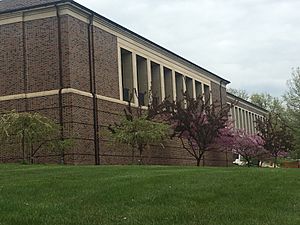Linda Hall Library facts for kids
Quick facts for kids Linda Hall Library of Science, Engineering and Technology |
|
|---|---|
 |
|
| Country | |
| Type | Special library |
| Established | 1946 |
| Location | 5109 Cherry Street Kansas City, Missouri |
| Coordinates | 39°1′59″N 94°34′44″W / 39.03306°N 94.57889°W |
| Collection | |
| Items collected | Books, journals, and pamphlets |
| Size | 500,000 |
| Website | http://www.lindahall.org/ |
| Phone number | 800-662-1545 |
The Linda Hall Library is a special library in Kansas City, Missouri. It's a huge library focused on science, engineering, and technology. It's known as one of the biggest science libraries in the world. It sits on a beautiful 14-acre garden filled with trees. This library is privately funded, meaning it gets its money from donations, not the government.
Contents
What is the Linda Hall Library?
The Linda Hall Library was started in 1946. It was created thanks to the generous gifts of Linda and Herbert F. Hall. They were important people from the Hall-Bartlett Grain Co. The library is famous around the world.
It is open to everyone. Students, teachers, and companies from Kansas City and other places use its large collection. Even though it's not part of the University of Missouri-Kansas City, many students from there use the library every day.
Cosmology Theater
The library has a special place called the William N. Deramus III Cosmology Theater. Here, you can see amazing pictures of the cosmos. These images come from the Hubble Space Telescope and NASA science missions. New pictures are sent to the library every day through the internet. This means visitors always have new things to explore.
The Tazza Display
In the middle of the main reading room, you'll find a large, beautiful object called "The Tazza". It's one of the biggest pieces of malachite in North America. Malachite is a green mineral. The Tazza was a gift from Czar Nicholas II to August Heckscher. Later, Helen Foresman Spencer gave it to the library in 1972. The reading room itself is very grand, with wooden floors, oak walls, and big windows looking out onto the lawn.
What Can You Find in the Collections?
The library has more than 2 million items in its collection. It started with over 62,000 books and other items. These items once belonged to John Adams, who later became a U.S. president. They were part of the American Academy of Arts and Sciences.
The collection includes many types of materials. You can find academic journals, papers from academic conferences, and reference works. There are also government publications, technical reports, and industry standards. You can even find U.S. patents and special books called monographs.
Engineering Societies Library
In 1995, the library received another huge collection. This was the Engineering Societies Library (ESL). This addition was as important as the original Academy collection. It brought many more journals and books about engineering. These included publications from major engineering groups like the American Society of Civil Engineers and the Institute of Electrical and Electronics Engineers.
History of Science Collection
The library has a special collection called the History of Science Collection. It has over 50,000 books. These include first editions of many very important science and technology books. Some of the oldest books are from the 1400s! The oldest book in the collection was printed in 1472. It is Pliny the Elder's Naturalis Historia (Natural History).
Online Access
Some of the works from the collection can be seen online. These include:
- Georg Joachim Rheticus Narratio Prima (from Gdańsk, 1540)
- Tycho Brahe Astronomicall Coniectur (from 1632)
- George Catlin North American Indian Portfolio (from 1844)
Important Historic Books
The collection also has other very important science books. Many of them are written in New Latin or other languages. Some examples are:
- Nicolaus Copernicus, De revolutionibus orbium coelestium (from Nuremberg, 1543)
- Galileo Galilei, Sidereus nuncius (from Venice, 1610)
- Isaac Newton, Philosophiae naturalis principia mathematica (from London, 1687)
- Charles Darwin, On the Origin of Species (from London, 1859)
Grounds and Arboretum
The library is surrounded by 14 acres of beautiful land. This area is like a park with over 338 trees. These trees belong to 52 different groups and 145 different types. There are also beds of viburnum, tree peonies, and plants native to Missouri.
Champion Trees
Seven trees on the property are called Greater Kansas City Champion Trees. This means they are the largest of their kind in the whole metropolitan area. These special trees include the Sweet Birch and the European Hornbeam. The National Wildlife Federation has given the library an award. This award is for their work in protecting the natural home for wildlife on the grounds.
Images for kids
See also
 In Spanish: Biblioteca Linda Hall para niños
In Spanish: Biblioteca Linda Hall para niños
 | Isaac Myers |
 | D. Hamilton Jackson |
 | A. Philip Randolph |



